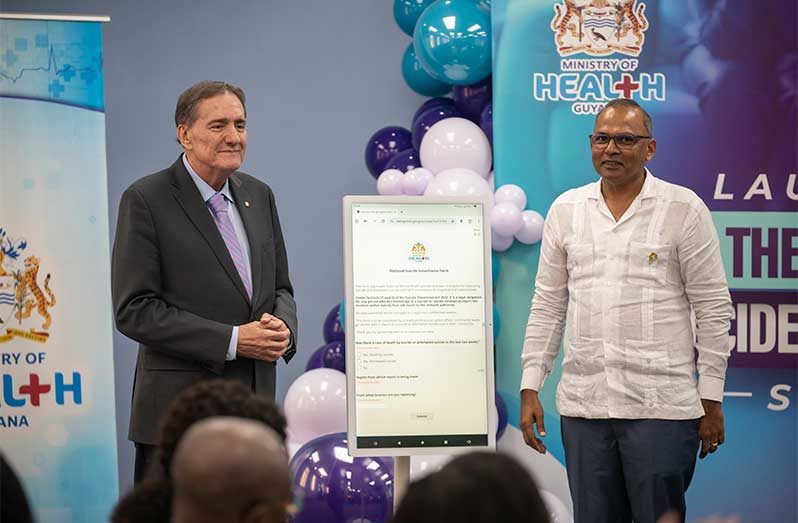– bringing real-time data on suicide, suicide attempts in Guyana
AIMED at providing quality real-time data on suicide and suicide attempts, the Ministry of Health, on Tuesday, launched the National Suicide Surveillance System.
Delivering remarks, Minister of Health, Dr Frank Anthony, stated that developing the system in electronic format and providing access to real-time information will allow for appropriate responses to suicide and attempted suicides and being able to prevent same.
Through collaborative efforts with the Pan American Health Organisation (PAHO) and consultants, Dr. Anthony noted that it began as policy and has moved far beyond that.
“We started with policy, and we did legislation; we went to policy and, from policy, we have a number of initiatives that we are now putting in place to ensure that we reform what we’re doing here in mental health,” he said.
Against this backdrop, he highlighted that since coming to office in 2020, the government has sought to modernise the legislation and place intense focus on mental health.
“For many years, Guyana had high suicide numbers, and we wanted to also have a very special focus on reducing the cases of suicide,” he said.
The Health Minister went on to note that one of the things they envisaged in the pieces of legislation passed thus far looked at ensuring whenever an attempted suicide or suicide happened, it should be reported in a timely manner so that officials have timely information and action is taken to have mental health professionals work with the individual and/or their families.
To this end, it was noted that the newly implemented system will allow for the monitoring of the results of the many suicide prevention initiatives implemented in Guyana over the past two years.
Additionally, it was stated that the system will serve as a backbone for Guyana’s national strategy to address the root causes of suicide and facilitate a comprehensive data-driven approach to understanding and addressing the complex issue of suicide in Guyana.
Meanwhile, Director of PAHO, Dr. Jarbas Barbosa, hailed the government of Guyana’s prioritisation of reforming mental health care at all levels with a focus on rights-based law reform.
He disclosed that PAHO has supported the ministry to advance mental health and suicide prevention in Guyana in the development of the Mental Health Protection and Promotion Act and the Suicide Prevention Act of 2022, along with the National Mental Health Plan 2023-2030.
Speaking on the newly launched system, Dr Barbosa stated, “Surveillance is an essential component of suicide prevention. Quality, real-time data on suicides and suicide attempts are crucial to understanding the problem, identifying high-risk groups, and responding early with effective and targeted interventions, which should always be evidence-based.”
Further to this, he noted that timely and accurate data on suicide and self-harm are vital to informing mental health service provision, resource deployment, and guidelines for managing suicidal behaviour.
The PAHO director added that the steps taken focused on surveillance and producing data for action will contribute to the fulfilment of commitments made in the 2030 Agenda for sustainable development to ensure healthy lives and promote well-being for all at all ages.
“I commend Guyana for recognising that mental health conditions, and their underlying risk factors and determinants deeply impact people in the places where they live, work and play,” he said.
As part of the surveillance system, an electronic data collection form aligned with international standards will be shared for and used by all community stakeholders, like the Guyana Police Force, Ministry of Health professionals or community workers, among others who are aware of a suicide or suicide attempts in their community.
This data, when gathered, will be stored securely on the Ministry of Health’s server in compliance with legal and confidential stipulations while also complying with Sections 31 and 32 of the Suicide Prevention Act 2022.
With the data coming in rapidly and in real time, the Ministry of Health can plan and prioritise interventions in areas where it is most needed.



.jpg)








